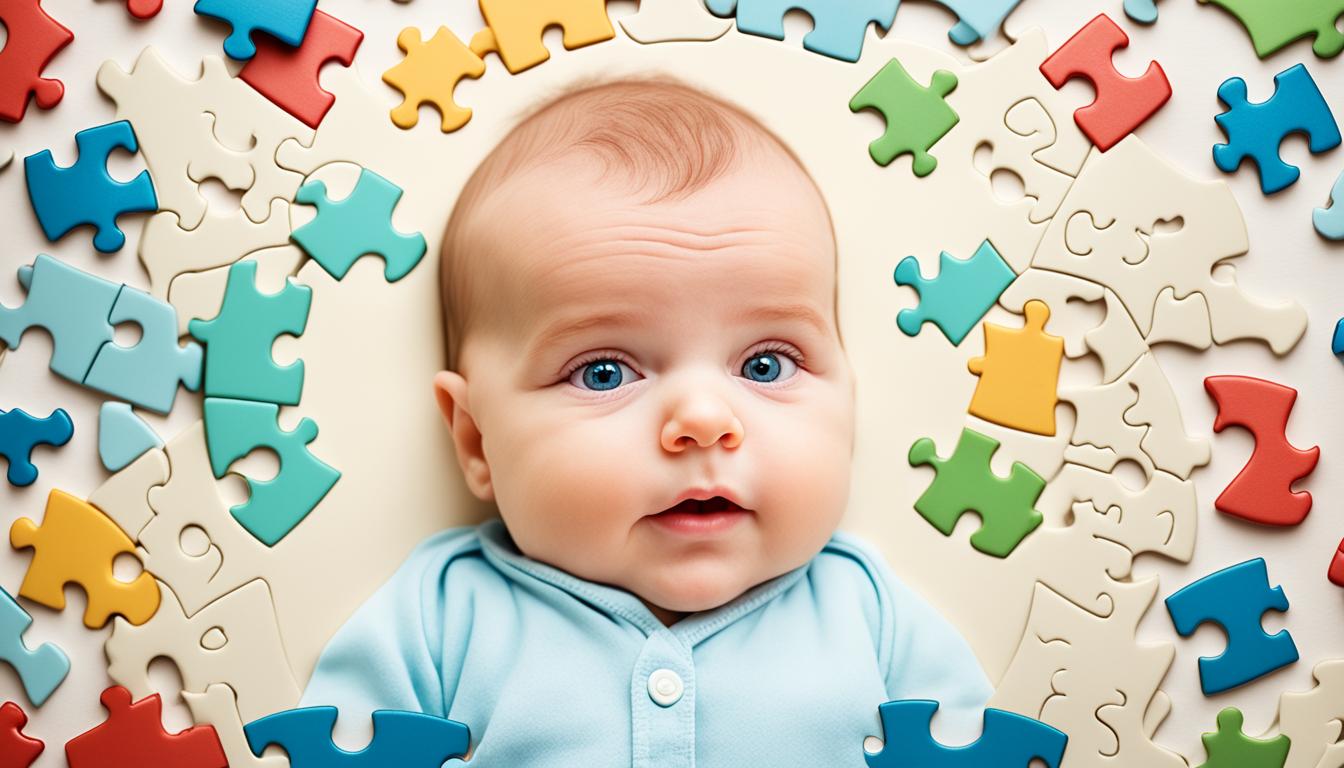Microcephaly is a condition where the brain has fewer neurons, leading to a smaller head. This is rare. It can result from genetic issues, drinking during pregnancy, or viruses. Signs include a small head, learning difficulties, and seizures.
Doctors often find microcephaly with ultrasound during pregnancy. Sadly, there’s no cure. But, care can improve life. This includes special education and therapies like physical or speech therapy. These help a lot.
Key Takeaways:
- Microcephaly means the brain has fewer neurons, causing a small head.
- Causes can be genetic issues, alcohol in pregnancy, or viruses.
- Symptoms include a tiny head and learning or seizure problems.
- Doctors typically spot this on ultrasound before birth.
- There’s no cure yet, but various therapies and support can really help.
Causes and Complications of Microcephaly.
Microcephaly is a condition where someone has a smaller head because of fewer brain cells. Many things can cause this. It’s important to know these things to help those with the condition.
Causes of Microcephaly
Gene issues and things in the world around us can cause microcephaly. Some genes, like Elp1, Elp2, and Elp3, when they change, they might cause the brain to grow small. This results in a person having microcephaly.
Drinking alcohol during pregnancy can cause microcephaly, which is part of fetal alcohol syndrome. Infections like the Zika virus while pregnant can also harm the baby’s brain, leading to microcephaly.
Complications of Microcephaly
Microcephaly can cause several problems that affect how a person learns and lives. These issues are:
- Intellectual disability: It can make learning and solving problems harder.
- Developmental delays: Kids might take longer to walk, talk, and grow mentally.
- Seizures: They could have seizures which makes things more difficult.
- Neurological problems: It might affect how well they move or their muscle strength.
To care for people with microcephaly, we must try to help with these problems. Early help, special education, and lots of therapies can improve their lives.
Diagnosis and Treatment for Microcephaly.
Doctors often spot microcephaly before birth using ultrasound. This shows if the baby’s head is smaller than it should be. They might do other tests like genetic testing to find the cause. These can show if something in the genes or the environment is causing the problem.
No cure exists for microcephaly now. But, treatments focus on lessening the symptoms and helping the person live their best life. The plan often involves teaching, therapies like physiotherapy, and support programs. These steps are crucial to help someone with microcephaly grow and learn better.
Stem cell therapy is a new hope in treating microcephaly. Research in Thailand is looking into how these therapies may help. The progress in this field offers a promise for a brighter future in treating microcephaly.
FAQ
Q: What is microcephaly?
A: Microcephaly means a baby’s brain isn’t fully developed. This causes their head to be smaller.
Q: What are the causes of microcephaly?
A: It can be due to many reasons, like genetics or things the mother does when pregnant. These include drinking alcohol or getting sick from viruses.
Q: What are the symptoms of microcephaly?
A: People with microcephaly often have small heads. They can also have trouble learning and moving. Some may have seizures too.
Q: How is microcephaly diagnosed?
A: Doctors can spot it early with a special ultrasound during pregnancy. They look for the baby’s head to be smaller than it should.
This test may lead to more tests to figure out why the baby has microcephaly.
Q: Is there a cure for microcephaly?
A: Unfortunately, there’s no cure for microcephaly. Making life better for those with it is the main goal.
Q: What is the treatment for microcephaly?
A: Helping a child with microcephaly often starts early. Special education, different types of therapy, and devices can improve their life.
Q: Are there any complications associated with microcephaly?
A: Microcephaly can lead to different problems. Some might struggle to learn or have seizures. Others could face various obstacles.
Q: Is there any prevention for microcephaly?
A: Yes, certain steps can lower the risk. Mothers should avoid alcohol and try to stay healthy. This includes safe sex and staying away from risky areas.
Q: Can stem cell therapy help with microcephaly?
A: Stem cell therapy might offer new hope for microcephaly. Researchers in Thailand are studying how well it works for these children.

